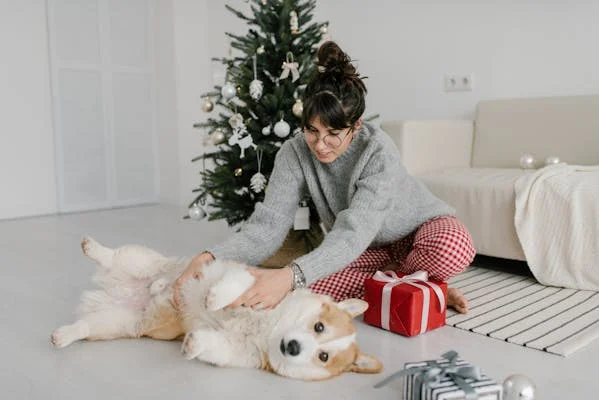As the holiday season approaches, it’s important to prioritize pet wellness ahead of the busy holiday season. With all the excitement, gatherings, and festive activities, it’s easy for pet owners to overlook their pets’ needs. However, ensuring that your furry friends remain safe, healthy, and comfortable during this hectic time is crucial. In this blog post, we’ll explore some essential tips to help maintain your pet’s wellness, from stress management to keeping them active, so they can enjoy the holidays just as much as you do.
The Impact of Holiday Stress on Pets
The holidays can be a stressful time for both humans and pets. For pets, the combination of increased noise, unfamiliar guests, and changes in routine can create anxiety and discomfort. Dogs and cats are particularly sensitive to changes in their environment and schedule. Stress can manifest in various ways, such as excessive barking, destructive behavior, or hiding.
Key signs of stress in pets include:
- Loss of appetite
- Excessive panting or drooling
- Aggression or irritability
- Hiding or avoiding interaction
- Changes in sleeping patterns
To help reduce stress, consider maintaining a consistent routine for your pet. If you’re hosting guests, create a quiet, designated space for your pet where they can retreat if they feel overwhelmed. You can also use calming products, like pheromone sprays or calming collars, to provide additional comfort.
Keeping Your Pet Active During the Holiday Hustle
The busy holiday season often leads to less time for regular walks, playtime, and outdoor activities. However, maintaining your pet’s physical health is just as important during this time. Regular exercise helps prevent weight gain, reduces anxiety, and improves overall well-being.
Here are some creative ways to keep your pet active:
- Indoor games: Play fetch or tug-of-war in a safe, spacious area inside your home.
- Interactive toys: Use puzzle toys that challenge your pet’s mind and keep them engaged.
- Short walks: If you can’t commit to a long walk, take your pet on multiple short walks throughout the day to keep them moving.
If your pet is used to regular outdoor exercise, make sure to adjust their routine based on the weather conditions. Cold temperatures can be harsh on paws, so use booties or apply paw balm to protect their feet.
The Importance of a Balanced Diet During the Holidays
During the holiday season, it’s tempting to treat your pets with leftover foods or holiday snacks. While it’s nice to indulge them a little, it’s important to remember that many holiday foods can be harmful to pets.
Foods to avoid include:
- Chocolate
- Grapes and raisins
- Onions and garlic
- Alcohol
- Bones (especially cooked bones)
Instead of giving your pets human food, stick to treats that are specifically designed for their dietary needs. Ensure that their regular meals remain well-balanced, providing the right mix of protein, fats, and carbohydrates to support their energy levels.
If your pet tends to gain weight during the winter months, consider adjusting their portion sizes or opting for lower-calorie treats.
Keeping Your Pet Safe During Holiday Festivities
The holiday season is full of fun and excitement, but it also introduces several safety hazards for pets. Decorations, gifts, and even certain holiday plants can pose risks to your pets’ well-being.
Common holiday hazards include:
- Christmas trees: Ensure the tree is securely anchored and keep fragile ornaments out of reach. Tinsel and tree lights can be hazardous if swallowed.
- Holiday plants: Plants like poinsettias, holly, and mistletoe can be toxic to pets if ingested. Keep them out of your pet’s reach.
- Electrical cords: Pets, particularly puppies and kittens, love to chew on cords, which can lead to dangerous electric shocks.
Make sure your home is pet-proofed, especially if you’re hosting gatherings. Keep harmful items out of reach and monitor your pet during parties to ensure they don’t get into any trouble.
Scheduling a Pre-Holiday Checkup for Your Pet
Before the busy holiday season begins, it’s a good idea to schedule a checkup with your veterinarian. A routine exam can help ensure that your pet is in optimal health and ready for the winter months.
What to discuss with your vet:
- Vaccinations and preventive care
- Weight management and diet recommendations
- Seasonal allergies or sensitivities
- Flea and tick prevention
During the checkup, you can also ask for recommendations on any seasonal products or supplements that might benefit your pet’s wellness.
Maintaining Emotional Well-Being Through Quality Time
One of the most important aspects of pet wellness ahead of the busy holiday season is the emotional connection you share with your pet. During the holiday rush, it can be easy to forget about the quality time you spend with them. However, pets thrive on attention and affection, which helps reduce anxiety and strengthen your bond. Take some time each day to engage with your pet. Whether it’s a cuddle session, a gentle brushing, or simply sitting together, these moments can help your pet feel more secure and loved.
Conclusion: Is Your Pet Ready for the Holidays?
The holiday season brings joy, excitement, and the chance to spend time with loved ones including your pets. By focusing on your pet’s wellness ahead of the busy holiday season, you can ensure that they remain healthy, happy, and safe throughout the festivities. Whether it’s managing stress, staying active, or avoiding harmful foods, a little extra care can make a big difference
FAQs about Pet Wellness Ahead of the Busy Holiday Season
1. How can I reduce my pet’s stress during holiday gatherings?
During holiday gatherings, your pet may feel overwhelmed by the noise and new people. To reduce stress, set up a quiet, comfortable space for your pet to retreat to. This could be a separate room with their bed and toys. You can also use calming products like pheromone diffusers or collars to help soothe their nerves.
2. Are holiday foods safe for my pet?
While it’s tempting to share holiday treats with your pet, many human foods are toxic to them. Avoid giving them chocolate, grapes, onions, garlic, alcohol, and cooked bones. Instead, stick to pet-friendly treats that are specifically designed for their nutritional needs.
3. What should I do to keep my pet active during the winter months?
Exercise is essential for your pet’s health, even during the colder months. If outdoor walks are difficult due to weather, try indoor activities such as fetch, tug-of-war, or using puzzle toys that engage your pet mentally. You can also take your pet on shorter, more frequent walks to keep them active.
4. What are some common holiday hazards for pets?
Holiday hazards include Christmas trees, which can be toppled or have ornaments that are dangerous if swallowed, and plants like poinsettias, mistletoe, and holly, which can be toxic to pets. Electrical cords, tinsel, and wrapping paper also pose risks. Always keep these items out of reach of curious pets.







